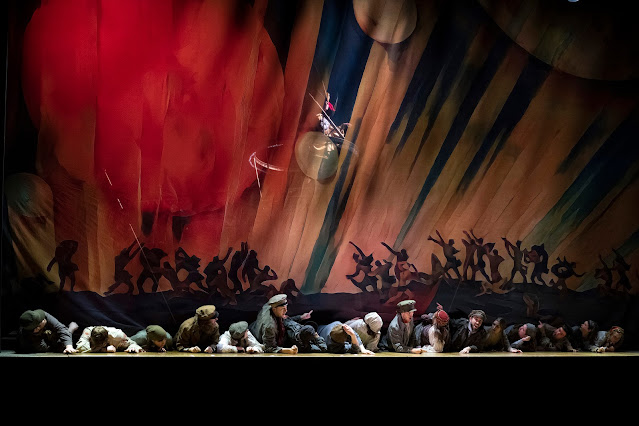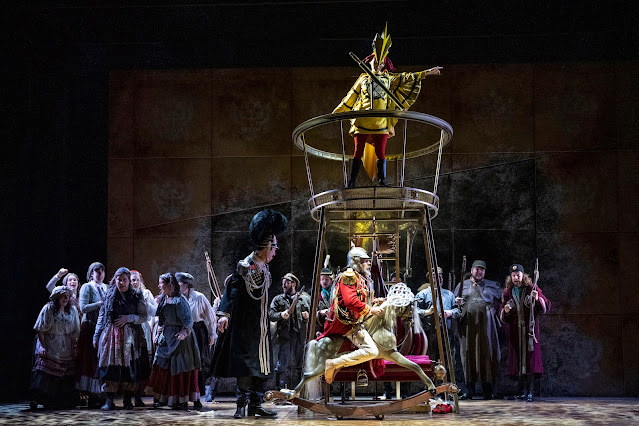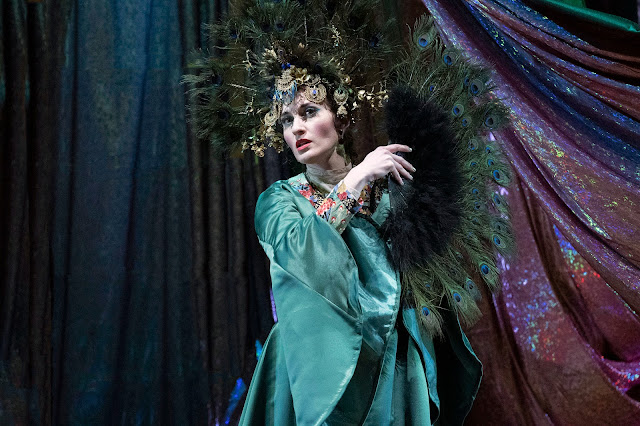 |
| Rimsky Korsakov: The Golden Cockerel - English Touring Opera (Photo Richard Hubert Smith) |
Rimsky Korsakov The Golden Cockerel; Paula Sides, Grant Doyle, Jerome Knox, Thomas Elwin, Edward Hawkins, Amy J Payne, Alys Mererid Roberts, Robert Lewis, dir: James Conway, cond: Gerry Cornelius; English Touring Opera at the Hackney Empire
Reviewed by Robert Hugill on 5 March 2022 Star rating: (★★★★)
A timely outing for Rimsky Korsakov's satire on Russian Imperialism manages to entertain and provoke
In advance of English Touring Opera's performance of Rimsky Korsakov's opera The Golden Cockerel on Saturday, there was a fascinating thread on Facebook that expanded on the work's anti-authoritarian agenda by looking at how many of the classic 19th century Russian operas seem to have a vein of being anti-authority, just think of Boris Godunov. Perhaps it was a vein in Russian thought, but you suspect the way that all of the composers in the Mighty Handful were outsiders (the profession of composer was hardly known in Russia) had something to do with it.
So, to the Hackney Empire on Saturday 5 March 2022, when English Touring Opera's new production of Rimsky Korsakov's The Golden Cockerel was dedicated to the people of Ukraine. Directed by James Conway and conducted by Gerry Cornelius, it featured Paula Sides, Grant Doyle, Jerome Knox, Thomas Elwin, Edward Hawkins, Amy J Payne, Alys Mererid Roberts, and Robert Lewis. Designs were by Neil Irish with lighting by Rory Beaton. The work was performed in the English translation by Antal Dorati and James Gibson, and used Iain Farrington's orchestral adaptation.
 |
| Rimsky Korsakov: The Golden Cockerel - Edward Hawkins, Grant Doyle, Alys Mererid Roberts - English Touring Opera (Photo Richard Hubert Smith) |
In many ways Rimsky Korsakov's final opera, written in 1908, is very like his others with its seductive orchestrations, use of neo-Oriental exoticism, folk-tale like plot that combines simplicity and ellipticism with an underlying message. Except that the message here was anti-war and anti-authoritarian, and Rimsky Korsakov wrote it in the wake of the Russo-Japanese war. The humour is broad, and the opera is such that it can seem a gentle armchair romp, but its first performance was delayed because the censors were twitchy, and that very gentleness can be disarming. King Dodon is something of an everyman figure, he can be whichever authoritarian idiot you want.
The setting was loosely the time of the work's premiere, though there were cartoonish elements to some of Neil Irish's costumes. The setting imaginatively used an element from the set of the tour's production of La Boheme, along with a central metal structure that doubled as King Dodon's throne, a tower for the Cockerel and the Queen of Shemakha's tent. This left plenty of space for the busy choral action, and Rory Beaton's imaginative lighting created just the right atmosphere. The striking drop curtain (also by Irish) was based on the Russian abstract movement Rayonism (I am grateful to a colleague on Facebook for pointing this out) which developed around the time of the opera's premiere.
The humour in the opera is quite broad, and James Conway let it be so, creating quite a lively and engaging backdrop. Grant Doyle's King Dodon went to war on a rocking horse, with a fly swat as a weapon, and there was great play with a phallically extending cannon. But his strong treatment of the chorus, in the war scenes which open Act Two, and in the fine chorus which greets King Dodon's death, made the undercurrents clear; King Dodon's idiocy led to the deaths of countless people in war. But there was another element too. When we first saw Robert Lewis' Astrologer he was got up on astrological garb, but his face, his beard looked a bit familiar. This was deliberate, in the epilogue when the Astrologer tells us that the story was an illusion, only himself and the Queen were real, then Robert Lewis removed the astrological garb to reveal a monks habit, and Paula Sides' Queen appeared looking very early 20th century, clearly Rasputin and Empress Alexandra of Russia. A moment which gave us a fascinatingly different, backward glance at the whole opera.
 |
| Rimsky Korsakov: The Golden Cockerel - Alys Mererid Roberts, Robert Lewis - English Touring Opera (Photo Richard Hubert Smith) |
Grant Doyle was a magnificent King Dodon, creating an engaging idiot of a character yet singing finely. This is a big role, Doyle was on stage for a lot of the time and he was a pleasure to listen to. And it was truly unnerving to watch someone having so much fun, yet knowing that this fun was leading to catastrophe. There was much more to Paula Sides' Queen than a well-known coloratura aria. Looking for all the world like Princess Turandot, there was something a bit scary about her. Sides sang the famous aria with a great sense of drama, seductive yet threatening and throughout their long scene in Act Two is was clear that Sides' Queen had the upper hand on Doyle's King Dodon.
The other roles are all somewhat smaller, but each has their own moment. Edward Hawkins was General Polkan, the voice of reason in Act One yet he too gets seduced by the Queen in Act Two. Hawkins brought a wonderful physicality to the role, making the general a memorable character even when the vocal line was less than thrilling. Thomas Elwin and Jerome Knox were King Dodon's childish sons, both having idiotic ideas about how to counter the threat of war and both singers having great fun. Amy J Payne was Amelfa, King Dodon's rather fearsome, but not un-sexy Nanny, a role Payne played with delightful relish.
Alys Mererid Roberts was the Cockerel, all jerky physical movements and a nice line in coloratura. The Astrologer is a tricky part, it is written for a high tenor and I remain unclear as to what Rimsky Korsakov wanted from the part, whether an aetherial otherworldliness or something more dramatic and violent. The role is too low for a countertenor and needs a tenor voice. Robert Lewis went at the role full throttle, throwing his vibrant voice up over the stage in a manner which brought out the Astrologer's threatening nature. This is not a big role, for all its significance in the drama, but Lewis made every contribution count.
 |
| Rimsky Korsakov: The Golden Cockerel - Paula Sides - English Touring Opera (Photo Richard Hubert Smith) |
The hard-working chorus of sixteen filled the stage with colour, movement and action, but when Rimsky Korsakov gave them something serious to do they filled the theatre with a fine, strong sound. In the pit, Gerry Cornelius drew some seductive timbres from the orchestra. Rimsky Korsakov gave the work its own particular sound world, and all credit to Iain Farrington's arrangement for managing to keep this whilst reducing the number of instruments used.
My first encounter with the opera was David Pountney's engaging production for Scottish Opera back in the 1970s, but when Covent Garden performed the work in 1998 (at Sadler's Wells Theatre), Tim Hopkins took rather a grimmer view of the work. It was lovely to find that James Conway's production managed to combine the political humour with a sense of delight and fun.
Never miss out on future posts by following us
The blog is free, but I'd be delighted if you were to show your appreciation by buying me a coffee.
Elsewhere on this blog
- A new opera, an unperformed 19th century opera, plus Weber & Bellini: I chat to Richard Tegid Jones of Rugby-based Random Opera Company - interview
- A joyful celebration of playing together: MiSST's 9th Annual Concert - article
- Urban dystopia: Guildhall School's double bill of Judith Weir's Miss Fortune and Menotti's The Telephone - opera review
- Elan and style: Grands Motets by Michel-Richard De Lalande from Sébastien Daucé and Ensemble Correspondances - record review
- Iceland: The Eternal Music - Graham Ross and the choir of Clare College explore the contemporary music of Iceland - record review
- A superbly engrossing performance: James Newby and Simon Lepper in Schubert's Die schöne Müllerin at Wigmore Hall - concert review
- English Touring Opera's revival of Puccini's La Boheme proves finely satisfying - opera review
- The Last Castrato: Max Hoehn and Torsten Rasch on their new collaboration as part of Opera21's platform for new opera - interview
- Manhattan to Montmartre: Bernstein and Gershwin transcriptions from Julian Jacobson and Mariko Brown - record review
- The cycle of life: Jamie Manton's new production of Janacek's The Cunning Little Vixen at English National Opera - opera review
- Phantasm completes its survey of all John Jenkins's viol consorts with a disc of his four-part consorts on Linn - record review
- Early Moderns: the (very) first Viennese School from American Baroque ensemble Quicksilver - record review
- Home

.jpg)









No comments:
Post a Comment